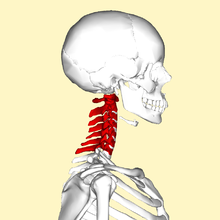| Radiculopathy | |
|---|---|
 | |
| C5-C6, followed by C6-C7, is the most common location for radiculopathy in the neck. | |
| Specialty | Neurosurgery |
Radiculopathy (from Latin radix 'root'; from Ancient Greek πάθος (pathos) 'suffering'), also commonly referred to as pinched nerve, refers to a set of conditions in which one or more nerves are affected and do not work properly (a neuropathy). Radiculopathy can result in pain (radicular pain), weakness, altered sensation (paresthesia) or difficulty controlling specific muscles.[1] Pinched nerves arise when surrounding bone or tissue, such as cartilage, muscles or tendons, put pressure on the nerve and disrupt its function.[2]
In a radiculopathy, the problem occurs at or near the root of the nerve, shortly after its exit from the spinal cord. However, the pain or other symptoms often radiate to the part of the body served by that nerve. For example, a nerve root impingement in the neck can produce pain and weakness in the forearm. Likewise, an impingement in the lower back or lumbar-sacral spine can be manifested with symptoms in the foot.
The radicular pain that results from a radiculopathy should not be confused with referred pain, which is different both in mechanism and clinical features. Polyradiculopathy refers to the condition where more than one spinal nerve root is affected.
- ^ "Cervical Radiculopathy (Pinched Nerve)". OrthoInfo by American Academy of Orthopaedic Surgeons. June 2015. Retrieved 22 September 2017.
- ^ "Pinched Nerve Symptoms & Treatment | Advanced Neurosurgery". Advanced Neurosurgery Associates. Retrieved 2020-12-14.